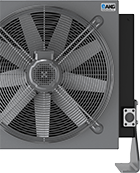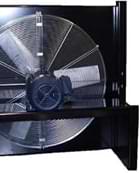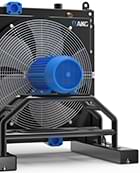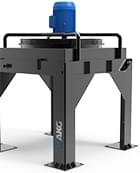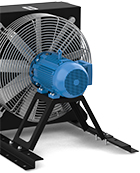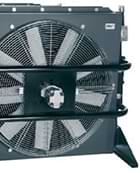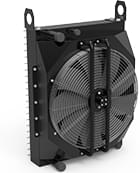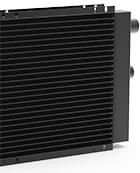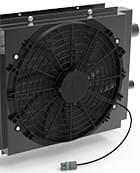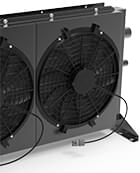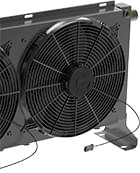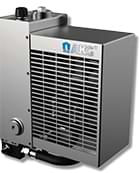AKG Coolers for Construction Equipment
Lubricating oil (lube oil) and hydraulic oil are vital fluids in industrial equipment, playing critical roles in ensuring smooth operation and enhancing the lifespan of machinery. Lube oil primarily reduces friction between moving components, minimizing wear and tear and protecting against corrosion. Hydraulic oil, on the other hand, serves as the medium for power transmission in hydraulic systems, enabling precise control and efficient operation in a variety of applications, from heavy machinery to industrial presses. All of the mechanisms using these fluids require a simple solution to cool them.
Both types of oil face extreme conditions, such as high pressures and temperatures, that can degrade their performance. Maintaining their optimal properties is crucial to avoid equipment failure, operational downtime, and costly repairs. This is where oil coolers become indispensable. By dissipating excess heat, oil coolers ensure that these fluids remain within their ideal temperature range, preserving their viscosity and effectiveness.
In hydraulic systems, overheating can lead to fluid oxidation, reduced efficiency, and potential component damage. Similarly, in lubrication systems, excessive heat can degrade oil quality, leading to increased friction and wear. The integration of efficient oil cooling systems not only protects the integrity of lube and hydraulic oils but also enhances the overall reliability, safety, and efficiency of industrial operations.
Types of Oil & Gas Equipment that Use Oil Coolers
Below are some examples of commong oil and gas industry equipment that rely on heat exchangers to cool their oil.
- Compressors: Compressors, especially in gas processing facilities, generate substantial heat during compression. Oil coolers help maintain optimal lubricant viscosity and prevent overheating.
- Pumps: Large hydraulic and centrifugal pumps used in oil and gas extraction and transportation often rely on oil coolers to regulate the temperature of their hydraulic systems.
- Hyedraulic Systems: Hydraulic power units (HPUs) used in drilling rigs, blowout preventers (BOPs), and subsea systems require oil coolers to ensure efficient operation and to prevent thermal degradation of hydraulic fluid.
- Turbines: Gas and steam turbines used for power generation and mechanical drives in oil and gas plants are equipped with lubrication systems that require oil coolers to maintain the integrity of turbine bearings and other components.
- Gearboxes: Gearboxes in offshore platforms, drilling rigs, and conveyor systems often experience high friction and require oil coolers to dissipate heat generated during operation.
- Engines: Internal combustion engines, such as those in generators, vehicles, or drilling equipment, use oil coolers to regulate engine oil temperature and ensure smooth performance.
- Winches and Cranes: Hydraulic systems in winches and cranes, particularly in offshore oil platforms, benefit from oil coolers to handle high-load operations without overheating.
- Subsea Equipment: Subsea pumps, motors, and control modules use oil coolers to manage heat in high-pressure environments.

